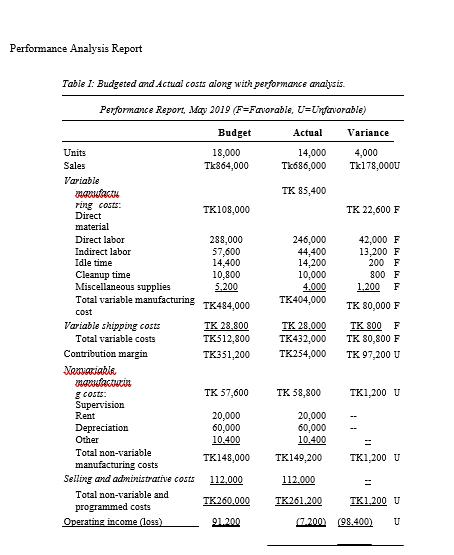Question
A look at the performance report affirmed Rahman's most exceedingly awful feelings. Rather than a planned profit of Tk 91,200, the report demonstrated the division
A look at the performance report affirmed Rahman's most exceedingly awful feelings. Rather than a planned profit of Tk 91,200, the report demonstrated the division made a loss of Tk7,200 in May. Taking into consideration the declining order, he considered an improved trend than demonstrated by the performance report. The factory accountant had connected the accompanying notice to the report:
June 6, 12:00 noon
Dear Sir
Please find attached the performance report for May. The profit figure is not as what we estimated it to be. It is to be noted that other than supervision costs most of the costs are under budget or at par almost. The unfavorable variance of costs associated with factory supervision was achieved by controlling other costs.
• Work in Progress and finished goods inventory at the beginning and end of the month are zero.
• Per unit standard costs used in budgeting this year were: Direct material Tk 6 Direct labor Tk 16
• It requires 130 grams (0.13 kg) of euro fine porcelain and 0.40 labor hour to produce one cup. Euro porcelain is a specialized material used in the ceramic product. Farr's estimated cost per kg of euro porcelain Taka 46. During the month, Farr purchased 1,820 kg of raw materials at the rate of Taka 46.92 per kg to produce 14,000 cups. All of the materials purchased were used for production. There were no ending raw materials.
• During the month the company recorded 5,467 direct labor hours at an hourly rate of Taka 45 to produce 14,000 units of products. Budgeted cost of labor per hour was Taka 40 (direct labor cost per Unit 16/0.40 hour required to produce one unit)
The falling order quantities from the foreign buyers were a cause for concern for FARR Ceramics and steps were needed to be taken to renegotiate larger, more profitable contracts with the buyer. As the executive pondered this unwanted reduction in demand from the foreign buyer and its long term implications on segment profitability, he was unable to shake off the looming concerns of inefficiencies which have caused a budget control failure and resulted in a net operating loss.
At the back of his mind, he was perfectly aware that a bid to cut down on costs to make the segment profitable once more can easily backfire by compromising quality and inability to export consignments on time. This delicate problem left him deep in thought as he gazed out from the window of his office contemplating the optimum solution to this complex dilemma.
CONCLUSION
Holistically, this case provides an opportunity to understand multifaceted issues in costing and delivering products and develop the skill set to prepare budgets taking a wide array of operational factors and product-related information into consideration.
This case familiarizes students with in-depth investigations of multidimensional constraints and challenges real-life organizations face when preparing, executing and controlling deviations from the budgeted quantities and values. This understanding is of cardinal importance in focusing on developing analytical skills through tackling real-life obstacles derived from case-based contexts.

QUESTIONS
1)Use the budget data to calculate the per-unit fixed and variable cost allocated to production. What was the actual cost per unit of production and shipping?
2)Draft a flexible budget based on the data provided.
3)Prepare a flexible budget performance report.
4)The factory accountant’s performance analysis report has been presented to Mr. Rahman. Using Table I, comment on the findings. Suggest areas of improvement before it is sent to the head office of FARR ceramics that the manager may like to be reflected in this analysis. (Hints: it might be useful to look into the material price and quantity variances and labor rate and efficiency variances)
5)What is the implication on non-variable manufacturing cost if the decline in order by Rosenthal continues? Prepare a sensitivity analysis considering the declining order trend and suggest FARR Ceramics’ possible ways of improving their current performance.
Performance Analysis Report Table 1: Budgeted and Actual costs along with performance analysis. Performance Report, May 2019 (F-Favorable, U=Unfavorable) Units Sales Variable manufactu ring costs: Direct material Direct labor Indirect labor Idle time Cleanup time Miscellaneous supplies Total variable manufacturing cost Variable shipping costs Total variable costs Contribution margin Namaziahla manufacturin g costs: Supervision Rent Depreciation Other Total non-variable Budget programmed costs Operating income (loss) 18,000 Tk864,000 TK108,000 288,000 57,600 14,400 10,800 5.200 TK484,000 TK 28,800 TK512,800 TK351,200 TK 57,600 20,000 60,000 10.400 TK148,000 manufacturing costs Selling and administrative costs 112,000 Total non-variable and TK260,000 91.200 Actual 14,000 Tk686,000 TK 85,400 246,000 44,400 14,200 10,000 4.000 TK 404,000 TK 28.000 TK432,000 TK254,000 TK 58,800 20,000 60,000 10.400 TK149,200 112.000 TK261.200 Variance 4,000 Tk178,000U TK 22,600 F 42,000 F 13,200 F 200 F 800 F 1,200 F TK 80,000 F TK 800 F TK 80,800 F TK 97,200 U TK1,200 U = TK1,200 U = TK1,200 U (7.200) (98.400) U
Step by Step Solution
3.45 Rating (155 Votes )
There are 3 Steps involved in it
Step: 1
Question 1 Calculation of per unit fixed and variable budgeted costs SN Particulars Values A Budgete...
Get Instant Access to Expert-Tailored Solutions
See step-by-step solutions with expert insights and AI powered tools for academic success
Step: 2

Step: 3

Ace Your Homework with AI
Get the answers you need in no time with our AI-driven, step-by-step assistance
Get Started


